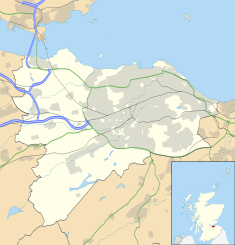
Summary
The South Queensferry Tollbooth is a municipal structure in the High Street, South Queensferry, Edinburgh, Scotland. The structure, which served as the meeting place of the Royal Burgh of Queensferry, is a Category A listed building.[1]
| South Queensferry Tolbooth | |
|---|---|
 The original tollbooth (on the right and behind) and the late 20th century memorial hall (on the left) | |
| Location | High Street, South Queensferry |
| Coordinates | 55°59′25″N 3°23′49″W / 55.9902°N 3.3969°W |
| Built | 1720 |
| Architectural style(s) | Scottish Renaissance style |
Listed Building – Category A | |
| Official name | Tolbooth, West Terrace, High Street, South Queensferry |
| Designated | 22 February 1971 |
| Reference no. | LB40411 |
Listed Building – Category B | |
| Official name | Rosebery Memorial Hall, 17 West Terrace, High Street, South Queensferry |
| Designated | 19 December 1979 |
| Reference no. | LB40410 |
 Shown in Edinburgh | |
History edit
The main block of the tolbooth was built in around 1630.[2][3] It was in this building that, in December 1643, seven women were incarcerated and tried for witchcraft for which the penalty was execution by strangulation and burning.[4][5] The west end of the ground floor was used as a weigh house while the east end was used as a prison and the first floor accommodated an assembly room.[3]
The structure was re-modelled with a four-stage steeple erected in front of the main block at the expense of the local member of parliament, Henry Cunningham, in 1720.[1] The steeple was faced with sandstone on the ground floor and with a harled finish on the first, second and third floors and fenestrated with square windows on the first and second floors and a round headed window on the third floor.[3] A courtroom was established on the first floor of the steeple at an early stage.[3][6]
In 1807, an octagonal belfry was added to the steeple and, in 1817, a plaque and a fountain were unveiled on the stairway up to the steeple to commemorate the contribution by Archibald Primrose, 4th Earl of Rosebery who had provided a bleachfield and a water supply for the town.[3] In 1888, clock faces were added to commemorate the Golden Jubilee of Queen Victoria, an innovation which the historian, Thomas Scott Muir, regarded as having "disfigured" the steeple.[7]
The complex was further expanded by the addition of the Rosebery Memorial Hall which was commissioned by Archibald Primrose, 5th Earl of Rosebery in memory of his wife, Hannah, and erected at a slight angle to the east of the main block. It was designed by Sydney Mitchell and Wilson in the Scottish Renaissance style, faced with similar finishes to the steeple and was completed in 1893.[3][8][9] The hall featured a Venetian window on the first floor with a pediment containing a date stone in the tympanum, all surmounted by an ogee-shaped gable.[10] Internally, the principal room in the memorial hall was the auditorium.[3]
A plaque to commemorate the lives of local service personnel who had died in the First World War was unveiled at the base of the steeple in November 1927.[11] The building remained the meeting place of the Royal Burgh of Queensbury for much of the first half of the 20th century but ceased to be the local seat of government after a new council chamber was installed at the former Viewforth Hotel further to the southeast along the High Street in 1945.[12] The complex subsequently served as an events venue with organisations such as the Central Scotland Ballet School renting the auditorium.[13]
See also edit
References edit
- ^ a b Historic Environment Scotland. "Tolbooth, West Terrace, High Street, South Queensferry (LB40411)". Retrieved 4 December 2021.
- ^ "South Queensferry Attractions". All About Edinburgh. Retrieved 4 December 2021.
- ^ a b c d e f g Historic Environment Scotland. "South Queensferry, High Street, Tolbooth (50562)". Canmore. Retrieved 4 December 2021.
- ^ Fyfe, William Wallace (1851). Summer life on land and water (at South Queensferry). Edinburgh: Oliver and Boyd. p. 100.
- ^ "The Witches of Queensferry". Queensferry History Group. 2 April 2015. Retrieved 4 December 2021.
- ^ MacGibbon, David; Ross, Thomas (1892). "The Castellated and Domestic Architecture of Scotland from the Twelfth to the Eighteen Century". Edinburgh: David Douglas. p. 112.
- ^ Muir, Thomas Scott (1912). "Linlithgowshire". Cambridge University Press. p. 106.
- ^ "South Queensferry Conservation Area Character Appraisal" (PDF). Edinburgh City Council. 2015. p. 18. Retrieved 4 December 2021.
- ^ "South Queensferry Tolbooth, Rosebery Memorial Hall". Dictionary of Scottish Architects. Retrieved 4 December 2021.
- ^ Historic Environment Scotland. "Rosebery Memorial Hall, 17 West Terrace, High Street, South Queensferry (LB40410)". Retrieved 4 December 2021.
- ^ "South Queensferry". Imperial War Museum. Retrieved 4 December 2021.
- ^ "A brief history of the City of Edinburgh council office Queensferry". Queensferry History Group. 1 October 2016. Retrieved 4 December 2021.
- ^ "South Queensferry Dance Classes". Central Scotland Ballet School. Retrieved 4 December 2021.


